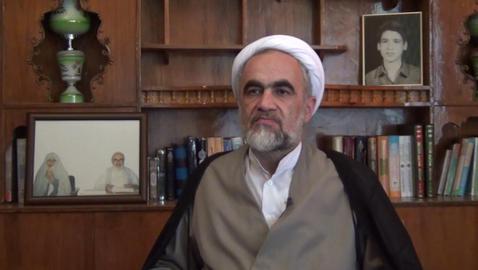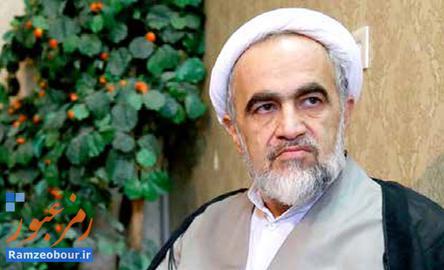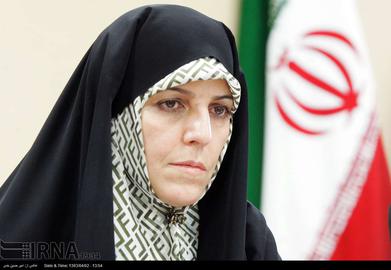The family of the late Ayatollah Hossein Ali Montazeri has announced its support for the reelection of Hassan Rouhani on May 19. “This round of the election is not a simple choice between two or more individuals,” the office overseeing his estate said in an announcement posted on Telegram. “It is the choice between two totally different ways of thinking and behaving.”
In summer 2016, the ayatollah’s son, Ahmad Montazeri, released an audio file from 1988. The clip documented Montazeri's August 15, 1988 meeting with the members of Iran’s revolutionary death panel, who were getting ready to order the mass execution of thousands of political prisoners. As punishment for releasing the file, the Special Clergy Court defrocked Ahmad Montazeri and sentenced him to 21 years in prison. He was charged with acting against national security, propaganda against the regime and publishing state secrets. However, the court then ruled that he had to serve only six years of this sentence. On March 4, 2017, Ahmad Montazeri presented himself at the court to start his sentence, but he was released after only two days and told that the sentence had been suspended.
Presidential candidate Ebrahim Raeesi was one of four members of the death panel. Raeesi, then 28, was Iran’s Deputy Prosecutor-General at the time. He has always defended the mass executions. Today, Iran’s conservative principlists are backing him to become president.
I talked to Ahmad Montazeri about Raeesi, Rouhani and the forthcoming election.
When you published the audio file, did you know that Mr. Raeesi planned to run for president?
Not at all. I did not even think it could happen. This looks very strange to me. There are so many figures with executive experience from various factions. It is very surprising that now somebody from the judiciary who has never had one day of experience [in the executive branch of government] can be a candidate.
Do you think the audio clip will make a difference in terms of how many people will vote for Mr. Raeesi?
As I said during interrogations, a question has been raised. It is best to clarify it so we can understand what it is about. What was this decree attributed to Ayatollah Khomeini? Was there really such a decree? Did they go overboard when it was carried out? What was the decree about? This must be investigated, and a truth-finding commission must be the one to carry out the investigation. This will benefit the people and the system, and will have an auspicious outcome.
The gentlemen [ultra-conservative politicians and members of the media] say releasing this tape caused damage and raised questions in people’s minds about the regime and the authorities. Well, they should turn this loss to profit by saying: we are so strong that we can solve this problem. Mr. Raeesi was one of the four who decided the fate of those people. If Mr. Raeesi comes to an open gathering and defends himself, maybe people would change their minds and everybody would learn what his position at the time was. But this question has been met with silence. This can only hurt Mr. Raeesi.
You have mentioned transparency and truth. But the atmosphere is such that even in presidential debates, people cannot decide who is telling the truth.
The debates were very regrettable. The presidential candidates said things about each other, but they did not elaborate, and so simply raised doubts [about other candidates]. Well, if there was free flow of information and freedom of the press, then these questions would have been examined over the course of time and we could have arrived at conclusions that we could respect. It could have stopped many further crimes or misconduct.
What was brought up [in the debates] was very painful to somebody like me. Because we believe that the regime is ours, we have worked hard to establish this system and we still hope that it can be reformed. We don’t want to overthrow and destroy it. We only want those who have created problems accept that they have done so and solve these problems.
The debates showed that, with all its heft and expanse, Sight and Sound [Iranian state-run broadcasting] cannot handle such events. In electoral debates in other countries, the moderator has absolute control. If somebody slanders others, the moderator stops him as soon as he starts. But in Iran’s debates, these gentlemen talked very little about their own policies. Ninety percent of the problem was caused by the weakness of the moderator.
You said that you consider the regime to be yours, but for years now the regime has been no friend to the family and associates of Ayatollah Montazeri. Why do you still support the regime?
You are right. The authorities do not appreciate the people. During my interrogations, the interrogator told me I was in contact with the families of the executed. “Don’t call them the families of the executed,” I told him. “These are people whose loved ones, whose children, spouses, sisters and brothers, have been put to death. You just call them the families of the executed?”
I told him that in one gathering, somebody told the mother whose child had been executed: “Mother, curse those who executed your child.” She immediately responded by saying: “Why should I curse a compatriot of mine and wish him hell? I pray that he will mend his ways and go to paradise.”
“Some of them have such great souls,” I said, “and now you just call them the families of the executed? You are not prepared to ease their pain even a little? At least tell them where the graves of their loved ones are so they can take some flowers and pray for them.”
Even the families of those who have been hurt by the revolution and the regime want things to be set right, not to overthrow the system. They want independence and territorial integrity to be safeguarded. We have to use them to reform our country. The regime must use this enormous capital. When everybody wants reform, then why shouldn’t we have reforms? Why shouldn’t we have freedom of the press and freedom of opinion? People do not expect the authorities to make confessions. It is enough for them to mend their ways. It is a step forward if they would only free political prisoners and those under house arrest and stop arresting people because they have different opinions and are in opposition. And I hope that this will happen.
It was under President Rouhani that you were imprisoned and received a heavy sentence. Many civil rights activists are still in prison. Many people who have boycotted the election ask: Why should they vote when these things have not changed and the president is powerless in such cases?
They judiciary branch is not under the command of the president and the branches are separate from one other. On the other hand, the president is responsible for safeguarding the constitution. If he sees that the constitution has been trampled on, he must say so immediately. It is not too much for the president to make such announcements, even if he has to do it every single day.
For example, he could announce that the judiciary has issued a verdict that violates a certain article in the constitution. The Special Clergy Court violates the constitution. The constitution clearly states that all courts must be under the supervision of the Justice Ministry, and this court is not. I released the audio file from a historic meeting that happened 28 years ago. Anywhere else in the world, such a thing is no longer considered a [classified] secret after so many years. Besides, the constitution clearly states that the confidentiality of any file is decided by whoever creates the file. This is what the law specifies, and the office of Ayatollah Montazeri has not said that this file is secret.
Occasionally, Mr. Rouhani has drawn attention to actions that are contrary to the constitution, but it would be much more effective if he discussed each specific case as it arose. I hope that over the next four years, he will accomplish this task.
Can you tell me what you think of each of the candidates and what his presidency would look like?
Under Mohammad Bagher Ghalibaf [the interview with Montazeri took place just before he dropped out of the race], the military would be put the helm, as it was during the presidency of Mr. Ahmadinejad. Then, the ministers of oil, culture and the interior and some provincial governors were all from the military. The commanders of the Revolutionary Guards were put in charge. Had he continued as president, the government would have resembled a government run by the military.
Ebrahim Raeesi’s government would look like Mr. Ghalibaf’s government — with one difference. A President Ghalibaf would have control over the government, but a President Raeesi would have no control, resulting in a military government that would not take orders from even the president and would act willfully and arbitrarily.
Under Mostafa Mir-Salim, technocrats would take over. He is an academic and a scientific figure. With what I know about Mr. Mir-Salim, and by what he has said in the debates I think he would put technocrats in charge.
Mostafa Hashemitaba is a logical person. He believes in science and in cause and effect. He calculates and does not act on whims. It shows in the way he talks.
Eshagh Jahangiri’s government would be like that of Mr. Khatami. More reformists and intellectuals would be put in charge.
Hassan Rouhani is a moderate and has tried to create a balance among various factions. I believe that the next four years will continue in the same manner.
visit the accountability section
In this section of Iran Wire, you can contact the officials and launch your campaign for various problems


























comments